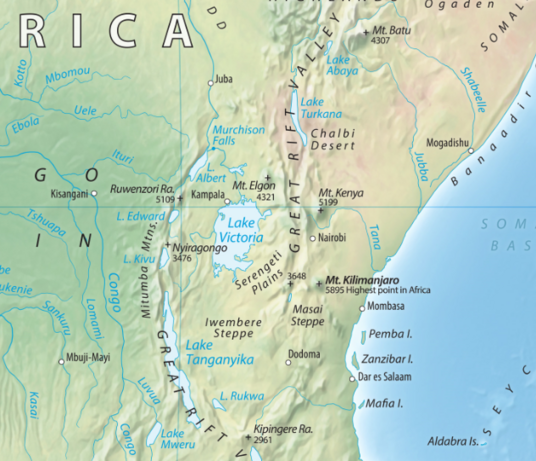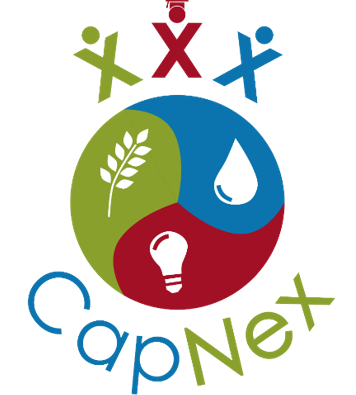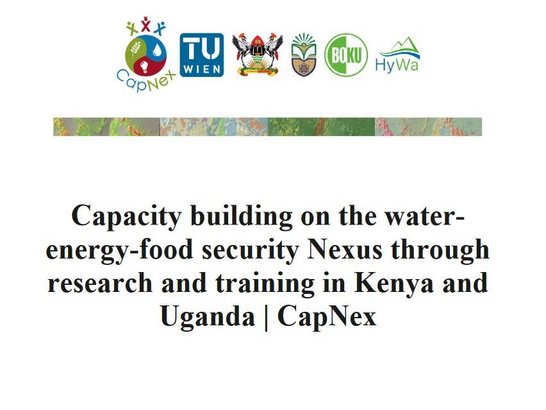
Capacity building on the water-energy-food security Nexus through research and training in Kenya and Uganda | CapNex

Project Coordinator: Dr. Jakob Lederer
Coordinating institution: TU Wien/Vienna University of Technology
Partner institutions: Makerere University (Dr. Jeninah Karungi-Tumutegyereize), Technical University of Kenya (Dr. Luke Olang), University of Natural Resources and Life Sciences, Vienna (Dr. Mathew Herrnegger)
Partner Countries: Uganda, Kenya
Project duration: 15th of December 2016 - 31st of August 2020
Abstract
Population and economic growth in the Kenya-Ugandan border region has led to an increasing demand for food, water and energy resources. However, the government’s plan to meet this demand by means of domestic production rather than through imports is impaired by several interlinked and often cross boundary challenges. Decreasing soil fertility is aggravated by erosion of top-soils rich in nutrients and biodiversity, reducing surface water quality and the ability to produce hydro-energy due to sediment-based silting of reservoirs. While some erosion protection and soil fertility measures (i.e. mulching, waste recycling) compete with the use of crop residues and wastes as a domestic energy source, soil erosion is further exacerbated by deforestation for fire wood production.
The impacts and effectiveness of mitigation measures designed to address these agricultural and hydrological aspects of the so-called Water – Energy – Food security (WEF) nexus requires, amongst others, a solid knowledge and data base established by research in all world regions concerned, addressing a wide range of stakeholders, in order to built-up capacities to deal with WEF nexus challenges. However, a review carried out prior to this proposal revealed that the bulk of research studies are discussion rather than research papers, while the majority of studies focus on China, Europe, the US, and the Middle East rather than Sub-Saharan Africa. Furthermore, most studies are on national, supranational and global level, not targeting the local level stakeholders.
In this project, an interdisciplinary (agronomy; crop production; pest management; development studies; hydrology; socio-hydrology; soil science; water-, waste-, & resource management) team of Austrian, Kenyan, and Ugandan researchers will cooperate in this capacity-building-through-research-training-and-dialogue-project under the APPEAR funding scheme. The activities carried out are threefold:
- Establishing the foundations for capacity building on the WEF nexus in Kenya and Uganda: Reviewing international and regional scientific literature and carrying out case study research projects in the Kenyan-Ugandan border region on the water household, erosion, soil and water conservation measures, and biomass utilization, thereby establishing a data- and knowledge base for WEF nexus investigation and capacity building.
- Capacity building on the WEF nexus at University level: By involving students in the case study research projects and developing course materials on the WEF nexus integrated in existing lectures and to be used to design new lectures, capacity building will be achieved at University level.
- Capacity building on the WEF nexus at non-University level: Within the case studies, non-university stakeholders like farmers and farmer groups are involved, thus trained. By giving workshops, a larger audience of stakeholders is targeted (District authorities, NGOs, private sector, etc.). Through giving speeches at national and international events, an even larger number of stakeholders are targeted.
List of project results
- 14 students of all levels did their final thesis in the project. Of these, in total 8 already completed their studies. The students were supervised by 13 Professors and senior staff.
- 8 completed final thesis are published, including 2 Bachelor thesis, 5 Master thesis, and one PhD thesis.
- 6 drafts of final thesis are available, including 1 Master thesis draft and 5 PhD thesis drafts.
- 3 scientific publications were published in high-ranked SCI indexed journals.
- 2 scientific publications were submitted for publishing in high-ranked SCI indexed journals.
- 5 drafts of scientific publications were prepared for publishing in high-ranked SCI indexed journals. These should be submitted by the end of the year.
- 57 participants followed courses carried out at TU Kenya and Makerere University.
- 729 students visited lectures in which results of the project were presented.
- 165 stakeholders participated in stakeholder workshops carried out in Busia, Bungoma, Chwele, and Kampala.
- 40 stakeholders participated in focus group discussions on soil and water conservation (Case study C)
- 800 farmers participated in questionnaire surveys (Case study B and C)
Impact and sustainability
Most project team members could benefit a lot from the project in terms of international and interdisciplinary cooperation, project management, research and capacity building. This particularly counted for the younger team members, but not only.
Career development of staff members and students involved directly in the project
From MU, Agnes Nalunga completed her Bachelor studies. She is now doing her Master studies at MU. Keneth Chelimo continued his work at the Ugandan National Agricultural Research Organization (NARO), the largest non-university organization of that kind in the country. Joseph Jjagwe applied for a PhD position at Wageningen University, one of the most renowned schools of agriculture science in the world. Out of over 60 applications from around the globe, Joseph was ranked as second. For this reason, he started working as research assistant at MU. Hyacinthe Nyirahabimana started in her new position as researcher at the renown International Institute of Tropical Agriculture (IITA) in Kigali, Rwanda. During the project, Alice Turinawe took over the responsibility of being the director of the Makerere University Agricultural Research Institute (MUARIK) in Kabanyolo. She handed over this position in January 2021 to her successor. During her time as Director, she managed to expand the size and activities of MUARIK. All other researchers from MU remained in their positions. From BOKU, Christoph Schürz moved to Germany where he started in a new position as Post-doc at TU Leipzig. Lea Schneider started working at the environment and sustainability consulting company ESG Plus in Vienna. At TU Kenya, all staff members involved in the project remain in their positions at the University. At TU Wien, Arabel Amann remains at her position as PhD student until completing her thesis. Jakob Lederer was promoted to a permanent Senior Scientist position at the Institute of Chemical, Environmental and Bioscience Engineering of TU Wien.
Impact of the project on the involved organizations
Follow-up project activities Allan Komakech from MU together with Johann Fellner and Jakob Lederer from TU Wien could win a project titled “Integrated Solid Waste Management in African cities for enhanced emission reduction“ submitted to the Cooperation Development Research Programme of the OeAD. The project was among the 14 sponsored out of 94 applications received. This again strengthens the position of both partners in development research. Mathew Herrnegger and his team were invited to join a consortium of the Ugandan Ministry of Water and Environment, International Institute for Applied Systems Analysis (IIASA) and other BOKU institutes to establish a data base on water resource management in Uganda. The associated project proposal of the consortium was submitted to ADA.
Improved teaching and lectures
All partners used the materials developed in the project for teaching in different courses. The results were already an uptake by other colleagues, students, and researchers. For instance, Joseph Jjagwe and Allan Komakech taught their colleagues from MU (Ahamada Zziwa, Simon Kizito, Isa Kabenge, Henry Kayondo) in vermicomposting and material flow analysis. The result was a journal article published by A. Zziwa in Elsevier’s Journal of Environmental Management.
General impact
The Institute of Hydrology and Water management of BOKU (HyWa) and the Institute for Water quality and Resource management (IWR) / Institute of Chemical, Environmental and Bioscience Engineering (ICEBE) at TU Wien strengthen their positions in interdisciplinary and international resource management. However, the position of IWR got again a bit weakened. MU strengthen its position in the regarding field, i.e. soil and water conservation and manure management. This was also internationally recognized, for instance in international conferences or after publishing a number of research findings. At TU Kenya, the Department of Biosystems and Environmental Engineering headed by Luke Olang benefitted from the project. Through experiences from the project, including collaboration with the local stakeholders, a certificate course in Integrated Water Resources Management has been developed for the Centre for Integrated Water Resources Management at the TU Kenya.
Impact of the project on the involved target groups
Authorities and government-owned companies including the National Water Providers and the National Agricultural Advisory Services were one of the main target groups of the project. Many of these pointed out quite clearly their expectations in the project, which included training and involvement. This was implemented, for instance by inviting two members of the Ugandan Ministry of Water and Environment (MoWE), Ms. Gwendolyn Zaake and Mr. Louis Mugisha, to participate in the “Advanced course on water quality management” in Rottenbach, Austria between 01—06.07.2018, organized by the Institute for Water Quality and Resource Management of TU Wien. Furthermore, authorities from the National Environment Management Authority (NEMA, Uganda) were invited to participate in training workshops on material flow analysis (Annex-TUW-00) and from the Kampala City Council Administration (KCCA, Uganda), the National Agricultural Research Organization (NARO, Uganda), MoWE, Busitema University (Uganda), Mbarara University (Uganda), Buvuma District Authorities (Uganda) on hydrology. We expect that these participants benefitted from the participation, as the feedback gained after the workshops were very good. Furthermore, for exchanging data, the national water and sewerage cooperation (NWSC) staff of Uganda claimed to be informed on the publications to be produced from their data. To put this claim in an official form of mutual benefit of both parties, it was decided that the research staff at NWSC will proofread and comment on the publications containing data provided by NWSC and therefore, this staff will act as co-authors. This will benefit the researchers as their results may be more likely used in policy making and strategic management, but also the NWSC staff as their knowledge and reputation increases.
Farmer groups and NGOs: Allan Komakech and his colleagues set-up four demonstration vermicomposting units with farmer groups in Tororo District. In addition, he provided training for their use. NGO members also participated in this activity.
Impact of the project beyond the involved groups
Hitherto, the project yielded a large number of presentations and publications, some of which gained a large audience in the international scientific community. This is remarkable, since the year 2020 was a difficult one for scientific dissemination, due to the absence of large conferences. In order to disseminate the results of the research internationally, the project team made use of research networks, commercial ones like Scopus or ORCID as well as open access ones like Researchgate (Link to the page of Jakob Lederer). The latest publication by Agnes Nalunga “,Growth characteristics and meat quality of broiler chicken fed earthworm meal from Eudrilus eugeniae as a protein source” published in January 2021, achieved 48 reads and one recommendation within one month after publishing on Researchgate. The project report uploaded in May 2020 achieved 77 reads, while the project overview itself 27 reads. Joseph Jjagwe’s publications on “Comparative Performance of Organic Fertilizers in Maize (Zea mays L.) Growth, Yield, and Economic Results” and “Assessment of a Cattle Manure Vermicomposting System Using Material Flow Analysis: A Case Study from Uganda” achieved in total 500 reads, one recommendations and 5 citations.

